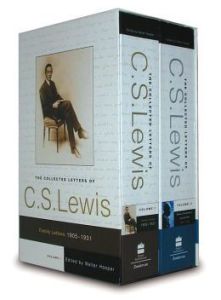 It’s been both a revelation and a joy to be able to sit in my study and systematically go through C. S. Lewis’s collected letters, concentrating on the correspondence he had with Americans. He became quite personal with a good number of regular correspondents, sharing tidbits of his life and offering whatever advice he could when they asked questions regarding the Christian life.
It’s been both a revelation and a joy to be able to sit in my study and systematically go through C. S. Lewis’s collected letters, concentrating on the correspondence he had with Americans. He became quite personal with a good number of regular correspondents, sharing tidbits of his life and offering whatever advice he could when they asked questions regarding the Christian life.
One of those letters, from January 1954, may provide a perfect example of how he combined the personal with the wisdom God gave him. He had a correspondent simply known as Mrs. D. Jessup, on whom there is apparently little information. All I can say about her is that she lived in a town called Rye, New York, and in this particular response to her, Lewis was guiding her through a time of suffering. Here’s what he wrote to her:
I don’t know whether anything an outsider can say is much use; and you know already the things we have been taught: that suffering can (but oh!, with what difficulty) be offered to God as our part in the whole redemptive suffering of the world beginning with Christ’s own suffering: that suffering by itself does not fester or poison, but resentment does; that sufferings which (heaven knows) fell on us without and against our will can be so taken that they are as saving and purifying as the voluntary sufferings of martyrs & ascetics.
And it is all true, and it is so hard to go on believing it. Especially as the dark time in which you are now entering (I’ve tried it; my own life really begins with my Mother’s illness & death from cancer when I was about 9) is split up into so many minor horrors and fears and upsets, some of them trivial & prosaic.
May God support you. Keep a firm hold of the Cross. And try to keep clear of the modern fancy that all this is abnormal & that you have been singled out for something outrageous. For no one escapes. We are all driven into the front line to be sorted sooner or later.
To me, it’s nearly unbelievable that Lewis would take so much time out of each day to write these letters. He sometimes complained of the need for so many responses, yet he felt the urging from God to be faithful; it was a vital part of his ministry. Reading them now, I am grateful that he chose faithfulness. He has given us a model to follow. May we exhibit such faithfulness, so those who follow us will have models as well.
